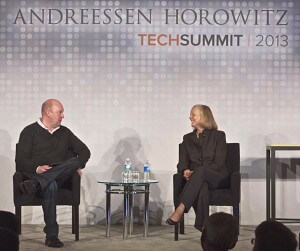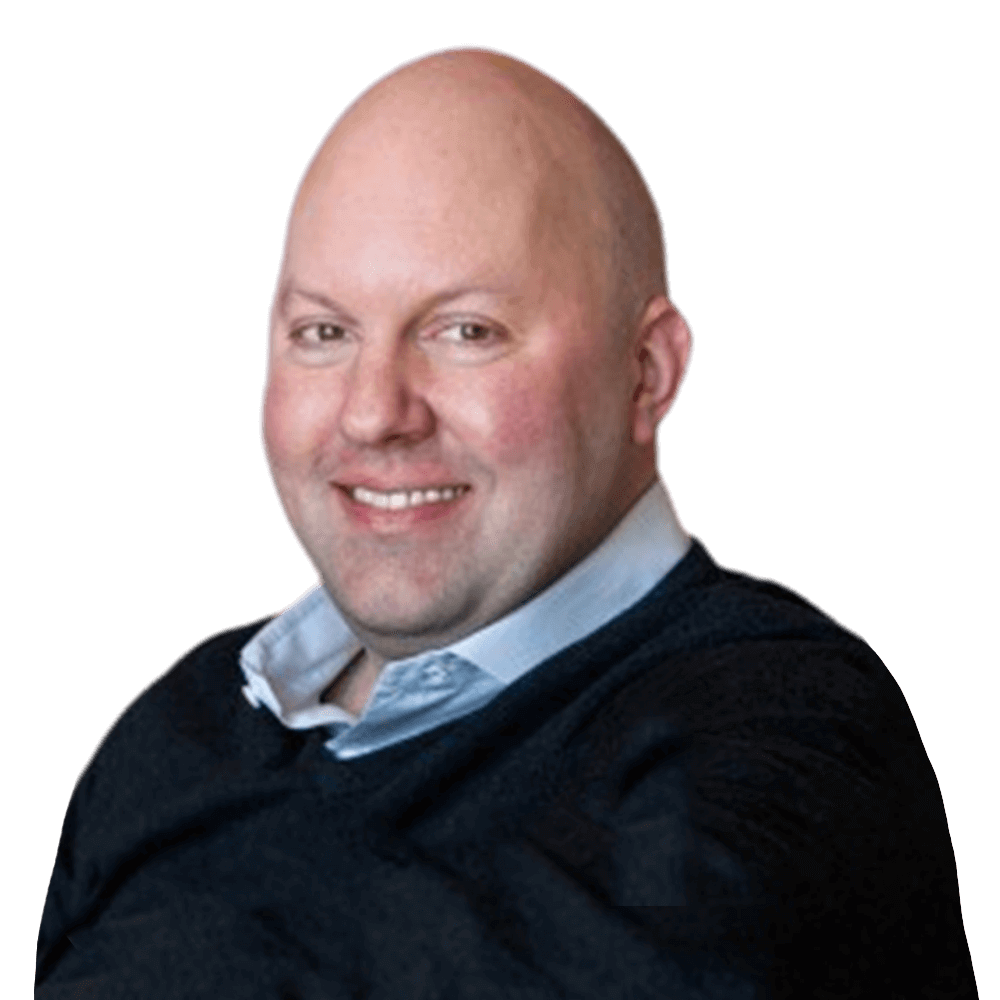Meg Whitman sat down with Marc Andreessen at a16z’s annual tech summit to talk about the tectonic shifts she is seeing in technology, her job running HP (Andreessen sits on the board), its role as one of the original Silicon Valley heavy-hitters, and what she believes that no one else does.
Marc Andreessen: Let’s talk about tech. Let’s play a fill-in-the-blank, you can have as many answers to this as you like. The tech industry is on the verge of _______ ?
Meg Whitman: A gigantic revolution on the scale of the mainframe to the client server transition in the enterprise.
Andreessen: Why’s that?
Whitman: In my view about every ten to fifteen years in our industry there are these huge tectonic plate shifts. You go all the way back to the mainframe to the client server, the client server to Web 1.0, where I had a front seat at the revolution, from Web 1.0 to what I would say is web services and mobile.
When these transitions happen, profit pools are in play, competitors come out of nowhere, innovation is at its finest. I think we’re about to go through a huge shift – everything about how technology is bought, how it is consumed, how it’s paid for, how apps are written, how end-users engage with technology.
You’ve seen this in the consumer space for some time. When I came to HP all my colleagues said don’t worry about it, you’re used to things moving really fast in the consumer space, but nothing really changes in the enterprise space except over very long periods of time – because the install base is so deep and so huge. (For example) the risk of migrating technology at Deutsche Bank is different than what you do in your home life. Anyway, they said, ‘don’t worry you’ll have plenty of time to turnaround the company before anything happens here.’
Well, the change in just my two years at HP around cloud, big data, security is simply remarkable. I feel like it’s moving almost at consumer pace. Look at the success at companies like Salesforce, Workday, Amazon Web Services and frankly our converged cloud and our private cloud system.
Andreessen: How on earth did we ever get you to take on the turnaround of a 40,000-person company operating in 170 countries, and $100 billion in revenue? How did we ever possibly talk you into it?
Whitman: I ask myself that same question every day. I’ll tell you a little story. After I lost the race for governor (of California) I was reasonably depressed. It’s one of those things where you’re running 100 miles-an-hour, and the day after the election you have nothing to do. Literally you wake up in the morning and you go, ‘OK what am I going to do?’ Around February I was at home at 4 o’clock in the afternoon and my husband, who is a neurosurgeon at Stanford, happened to come home early. And he looked at me, and I was sitting there watching Ellen Degeneres at 4 o’clock in the afternoon. And he goes, ‘Oh, this is not good, this is really not good.’ And just coincidentally almost at that same time, you called me to be on the HP board, on the tech committee. And I said, ‘Great, fantastic, HP’s a great company, 12 minutes from my house, what can go wrong?’
Originally, I was reasonably reluctant, but in the end what happens to companies like HP in my view really matters. This is the grandfather of Silicon Valley. I think it’s really important for the first and second-generation companies to continue to play a real role. It’s important to Silicon Valley and important to California and important to all the communities in which we do business. And it’s an important balance in the industry. In the end that’s why I decided to do it.
Andreessen: In the darkest days before you arrived at HP, as many companies do, there was this big voice of the workplace survey. There was an extraordinary phenomenon I found which is unhappiness among the employee base exactly correlated to the following: Employees in the United States, older employees, male employees, white employees. Satisfaction exactly correlated to the opposite: Outside the U.S., young, non-white, and female. HP’s employee base is 70-percent outside the U.S. What’s the process like to have that scope of talent, how much international talent are we finding? How are the good people surfacing?
Whitman: I would say that one of our big benefits is the reputation of HP outside of the United States is really quite pristine. The farther you get from Palo Alto, they didn’t read about the board drama. You go to China, India, Indonesia, Brazil, Russia, people still kill to work at HP. We have an incredible pipeline of young kids and early career people who are really talented. I will take our India team and put them up against anyone, it is really remarkable. Actually what we’re trying to do now is bring some of those people to Palo Alto to repopulate some of the things that must be here in California.
I have to say we’re really fascinated by what’s going on in Shenzhen, China. What’s happening there is the ODMs — people who make the devices for us, who manufacturer for us, laptops and other things — are run by young people.
There’s a whole new ecosystem there. The reason why there are thousands of thousands of consumer tablets for $49 on any major website at any major retailer is because of what’s going on in Shenzhen. One of the people we met and do business with is a company called BYD, and run by an incredibly dynamic young Chinese guy. The acronym stands for Build Your Dream, and that’s what they are about. It’s so reminiscent of Silicon Valley, it’s just incredible. The next century, we have to be so cognizant of what’s happening in Asia.
Andreessen: Before you took on this role you had a very exciting run at the governor’s office in California. What lessons did you take away from the experience running for governor of California, and are any of those lessons ones you can apply to what you’re doing now?
Whitman: I didn’t think there was going to be much relevance to running for public office and running HP. But surprisingly sometimes things happen for a reason, and a lot of what I went through running for governor has been extraordinarily valuable for me. What you learn when you’re running for public office is that it’s one brutal rough and tumble game. And there are no results until the end, so journalism is opinion journalism, and the stuff they say about you is simply remarkable. The stuff that happens is beyond what most people can take.
So I show up at HP really quite bruised, but what I hadn’t realized was how tough I had become. The stuff that happened in my first year, the Autonomy write-down, the EDS write-down, missing plans by huge amounts; we were rolling from prices to prices. And I have to say, nothing really bothered me.
I now have such a high bar. If they’re not attacking you, not attacking your children, not questioning your character, it’s all good. It has given me a sense of calmness that I think has been very good for HP, because everyone takes their cues from their leaders. I’ve been kind of like, ‘alright, this is all going to be just fine.’
Andreessen: What do you believe that nobody else does?
Whitman: I do not think PCs are dead. Listen, my view is that PCs may not exist in the exact form factor they are in today. But all of you know that people at work actually have to do real work. The ability to create, to consume, and to share is actually going up dramatically. The desire for compute is going up dramatically. I think there is a spectrum of personal compute from workstations to desktops to laptops to hybrids to tablets to smartphones. My view is at least for the next five to ten years, there are going to be people who want to be able do real work, real productivity, who are going to need more than a smartphone or a tablet.
We’re investing (against that). There are pockets of growth there. We obviously have to get better at anticipating new form factors and new consumption models. PC as a service is coming our way, but I don’t think the form factor is dead.
- Money, power, politics, and the internet’s next battleground
- Fixing Higher Education & New Startup Opportunities with Marc and Ben
- Crisis in Higher Ed & Why Universities Still Matter with Marc & Ben
- The Future of Longevity with Tony Robbins
- The Techno-Optimist Manifesto with Marc Andreessen and Ben Horowitz



